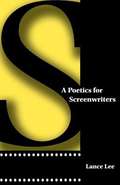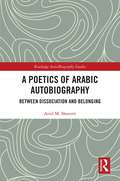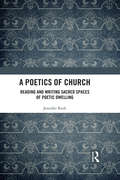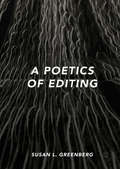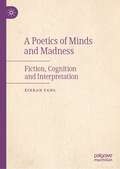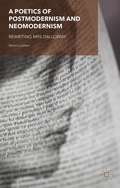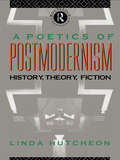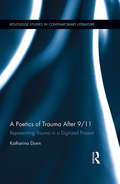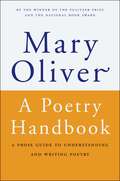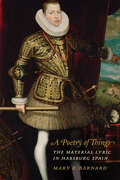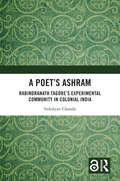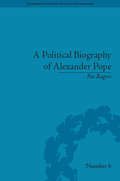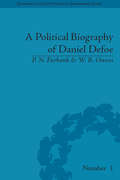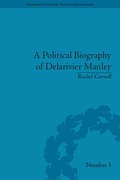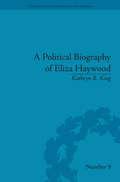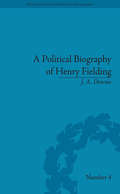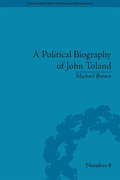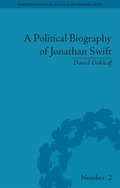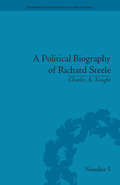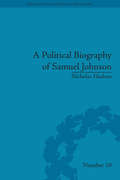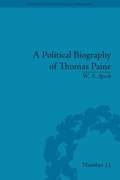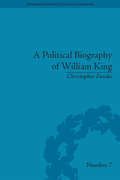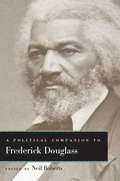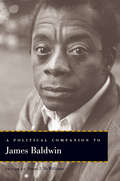- Table View
- List View
A Poetics for Screenwriters
by Lance LeeWriting successful screenplays that capture the public imagination and richly reward the screenwriter requires more than simply following the formulas prescribed by the dozens of screenwriting manuals currently in print. Learning the "how-tos" is important, but understanding the dramatic elements that make up a good screenplay is equally crucial for writing a memorable movie. In A Poetics for Screenwriters, veteran writer and teacher Lance Lee offers aspiring and professional screenwriters a thorough overview of all the dramatic elements of screenplays, unbiased toward any particular screenwriting method.<P><P> Lee explores each aspect of screenwriting in detail. He covers primary plot elements, dramatic reality, storytelling stance and plot types, character, mind in drama, spectacle and other elements, and developing and filming the story. Relevant examples from dozens of American and foreign films, including Rear Window, Blue, Witness, The Usual Suspects, Virgin Spring, Fanny and Alexander, The Godfather, and On the Waterfront, as well as from dramas ranging from the Greek tragedies to the plays of Shakespeare and Ibsen, illustrate all of his points.<P> This new overview of the dramatic art provides a highly useful update for all students and professionals who have tried to adapt the principles of Aristotle's Poetics to the needs of modern screenwriting. By explaining "why" good screenplays work, this book is the indispensable companion for all the "how-to" guides.
A Poetics of Arabic Autobiography: Between Dissociation and Belonging (Routledge Auto/Biography Studies)
by Ariel M. SheetritThis book examines the poetics of autobiographical masterpieces written in Arabic by Leila Abouzeid, Hanan al-Shaykh, Samuel Shimon, Abd al-Rahman Munif, Salim Barakat, Mohamed Choukri and Hanna Abu Hanna. These literary works articulate the life story of each author in ways that undermine the expectation that the "self"—the "auto" of autobiography—would be the dominant narrative focus. Although every autobiography naturally includes and relates to others to one degree or another, these autobiographies tend to foreground other characters, voices, places and texts to the extent that at times it appears as though the autobiographical subject has dropped out of sight, even to the point of raising the question: is this an autobiography? These are indeed autobiographies, Sheetrit argues, albeit articulating the story of the self in unconventional ways. Sheetrit offers in-depth literary studies that expose each text’s distinct strategy for life narrative. Crucial to this book’s approach is the innovative theoretical foundation of relational autobiography that reveals the grounding of the self within the collective—not as symbolic of it. This framework exposes the intersection of the story of the autobiographical subject with the stories of others and the tensions between personal and communal discourse. Relational strategies for self-representation expose a movement between two seemingly opposing desires—the desire to separate and dissociate from others, and the desire to engage and integrate within a particular relationship, community, culture or milieu. This interplay between disentangling and conscious entangling constitutes the leitmotif that unites the studies in this book.
A Poetics of Church: Reading and Writing Sacred Spaces of Poetic Dwelling
by Jennifer ReekThis innovative book aims to create a ‘poetics of Church’ and a ‘religious imaginary’ as alternatives to more institutional and conventional ways of thinking and of being ‘Church’. Structured as a spiritual and literary journey, the work moves from models of the institutional Catholic Church into more radical and ambiguous textual spaces, which the author creates by bringing together an unorthodox group of thinkers referred to as ‘poet-companions’: the 16th-century founder of the Society of Jesus, Ignatius of Loyola, the French thinkers Gaston Bachelard and Hélène Cixous, the French poet Yves Bonnefoy, and the English playwright Dennis Potter. Inspired especially by the reading and writing practices of Cixous, the author attempts to exemplify Cixous’ notion of écriture féminine—‘feminine writing’—that suggests new ways of seeing and relating. The project’s uniting of Ignatian spirituality with postmodern thinking and its concern with creating new theological, literary and spiritual spaces for women both coincide and contrast with Pope Francis’s pastoral and reformist tendencies, which have neglected to adequately address the marginalisation of women in the Church. As Francis has called for ‘a theology of women’, of which there are, of course, many to draw from, this volume will be a timely contribution with a unique interdisciplinary approach.
A Poetics of Editing
by Susan L. GreenbergThis original and authoritative book offers a first-ever attempt to define a poetics of the editing arts. It proposes a new field of editing studies, in which the ‘ideal editor’ can be understood in relation to the long-theorised author and reader. The book’s premise is that editing, like other forms of ‘making’, is mostly invisible and can only be brought into full view through a comparative analysis that includes the insights of practitioners. The argument, laid down in careful layers, is supported by a panoramic historical narrative that tracks the shifts in textual authority from religious and secular institutions to the romanticised self of the digital present. The dangers posed by the anti-editing rhetoric of this hybrid romanticism are confronted head-on. To the traditional perception of editing as the imposition of closure, A Poetics of Editing adds a perspective on a dynamic process with a sense of the possible.
A Poetics of Minds and Madness: Fiction, Cognition and Interpretation
by XINRAN YANGThis monograph aims to explore the mind-narrative nexus by conducting a cognitive narratological study on the mad minds in fictional narratives. Set on the interface of narrative and cognitive science (cognitive linguistics, cognitive psychology and cognitive neuropsychology), it adopts an indirect empirical approach to the fictional representation of madness. The American writer Ken Kesey’s novel One Flew Over the Cuckoo’s Nest is chosen as the primary text of investigation, whereas due consideration is also given to other madness narratives when necessary. This book not only demonstrates the value of reading and rereading literary classics in the modern era, but also sheds light on the studies of cognitive narratology, cognitive poetics, madness narratives and literature in general.
A Poetics of Postmodernism and Neomodernism
by Monica LathamVirginia Woolf's Mrs Dalloway, one of the most significant modernist texts from the Western literary canon, has spawned numerous contemporary offspring. Contemporary authors have dialogued with it, challenged it, reinvented it and offered creative responses to it, thus reinforcing its accumulated critical reputation and canonical status. After meticulously tracing the genesis of Woolf's most iconic novel so as to examine the production of Woolf's idiosyncratic Dalloway-esque signature, A Poetics of Postmodernism and Neomodernism sets out to explore its reproduction by a variety of postmodernist and neomodernist Anglo-American writers who are either openly indebted to Woolf's novel or covertly influenced by it. The contemporary tributes that are indebted to Mrs Dalloway in so many ways have rejuvenated the Woolfian novel and have propelled it into the twenty-first century. Almost a hundred years after its publication, Woolf's Mrs Dalloway has proved to be an enduring text, an 'ice-breaking vessel' which continues to invite 'individual talents' to follow in its wake.
A Poetics of Postmodernism: History, Theory, Fiction
by Linda HutcheonFirst published in 1988. Routledge is an imprint of Taylor & Francis, an informa company.
A Poetics of Relation: Caribbean Women Writing at the Millennium
by Odile FerlyA Poetics of Relation fosters a dialogue across islands and languages between established and lesser-known authors, bringing together archipelagic and diasporic voices from the Francophone and Hispanic Antilles. In this pan-diasporic study, Ferly shows that a comparative analysis of female narratives is often most pertinent across linguistic zones.
A Poetics of Trauma after 9/11: Representing Trauma in a Digitized Present (Routledge Studies in Contemporary Literature)
by Katharina DonnThe 9/11 attacks brought large-scale violence into the 21st century with force and have come to epitomize the entanglement of intimate vulnerability and virtual spectacle that is typical of the globalized present. This book works at the intersection of trauma studies, affect theory, and literary studies to offer radically new interpretive frames for interrogating the challenges inherent in representing the initial moments of the terrorist encounter. Beyond the paradigm of traumatic unspeakability, post-9/11 texts expose the materiality of the human body in its universal vulnerability. The intersubjective empathy this engenders is politically subversive, as it undermines the discourse of historical singularity and exceptionalism by establishing a global network of reference and dialogue. Innovative theoretical interconnections between clinical pathology, concepts of cultural trauma, and political aesthetics lay the foundations for exploring formally and geographically diverse texts. Close readings of works by Jonathan Safran Foer, Art Spiegelman, Don DeLillo, and William Gibson map the relationship between representations of 9/11 and complex aspects of trauma theory. This detailed approach makes a case for revisiting trauma theory and bringing its Freudian origins into the digitized present. It showcases trauma as a physical and psychological wound as well as an experience that is simultaneously pre-discursive and inhibited by the virtuality of the present-day real. Exploring how contemporary trauma studies can take into account the digitization and virtuality of present-day realities, this book is a key intervention in establishing a contemporary ethics of witnessing terror.
A Poetry Handbook: A Prose Guide to Understanding and Writing Poetry
by Mary Oliver“Mary Oliver would probably never admit to anything so grandiose as an effort to connect the conscious mind and the heart (that’s what she says poetry can do), but that is exactly what she accomplishes in this stunning little handbook.”—Los Angeles Times From the beloved and acclaimed poet, an ultimate guide to writing and understanding poetry. With passion and wit, Mary Oliver skillfully imparts expertise from her long, celebrated career as a disguised poet. She walks readers through exactly how a poem is built, from meter and rhyme, to form and diction, to sound and sense, drawing on poems by Robert Frost, Elizabeth Bishop, and others. This handbook is an invaluable glimpse into Oliver’s prolific mind—a must-have for all poetry-lovers.
A Poetry of Things: The Material Lyric in Habsburg Spain (Toronto Iberic)
by Mary E. BarnardA Poetry of Things examines the works of four poets whose use of visual and material culture contributed to the remarkable artistic and literary production during the reign of Philip III (1598–1621). Francisco de Quevedo, Luis de Góngora, Juan de Arguijo, and Luisa de Carvajal y Mendoza cast cultural objects – ranging from books and tombstones to urban ruins, sculptures, and portraits – as participants in lively interactions with their readers and viewers across time and space. Mary E. Barnard argues that in their dialogic performance, these objects serve as sites of inquiry for exploring contemporary political, social, and religious issues, such as the preservation of humanist learning in an age of print, the collapse of empires and the rebirth of the city, and the visual culture of the Counter-Reformation. Her inspired readings explain how the performance of cultural objects, whether they remain in situ or are displayed in a library, museum, or convent, is the most compelling.
A Poet’s Ashram: Rabindranath Tagore’s Experimental Community in Colonial India
by Sukalyan ChandaThe remarkably creative life Rabindranath Tagore (1861–1941) lived has long been an area of scholarly enquiry. Yet, surprisingly, his role as the founder of an experimental ashram community remains unexplored. A Poet’s Ashram retrieves his idea of his ashram through an exploration of his writings on the institutions he built.The ashram community Tagore endeavoured to create in Santiniketan during the period 1901–1941 was his response to the question of modernity. Through his effort to reinvent the ancient Indian ideal of the ashram, he articulated his idea of a mode of collective living that was meant to be grounded in a set of ethical values derived from India’s civilizational inheritance. This book traces the history of how his ashram school evolved into a community that practised egalitarianism, inclusiveness and creativity through its daily existence. It explores a range of nineteenth- and twentieth-century discourses and Tagore’s engagement with them in order to situate that idea within its historical context, a critical juncture in the history of modern India and the world. This book’s reading of his project unravels its anti-colonial underpinnings and the commonalities it shared with some of the other similar experimental communities that challenged illiberal ideologies and power relations during the early twentieth century.Meticulously researched and perceptively written, this book will be of interest to students and researchers of history, political science, culture studies and postcolonial studies. It will also be of interest to educationists, educators and those interested in colonial modernity, modern Indian history, philosophy of education, institution building, peace, inclusivity and sustainability.
A Political Biography of Alexander Pope (Eighteenth-Century Political Biographies #6)
by Pat RogersThis is the first study to assess the entire career of Alexander Pope (1688-1744) in relation to the political issues of his time.
A Political Biography of Daniel Defoe (Eighteenth-Century Political Biographies #1)
by P N Furbank W.R. OwensFurbank and Owens attempt to disentangle the story of Daniel Defoe’s political career, as journalist, polemicist, political theorist and secret agent. They argue that this remarkable career calls for a good deal of rethinking, not least because biography and bibliography are here inextricably intertwined.
A Political Biography of Delarivier Manley (Eighteenth-Century Political Biographies #3)
by Rachel CarnellA Tory pamphleteer, playwright and satirical historian, Delarivier Manley was regarded by her contemporaries Jonathan Swift and Robert Harley as a key member of the Tory propaganda team. This biography offers details about her life, including evidence about three illegitimate children by John Tilly, Governor of Fleet Prison.
A Political Biography of Eliza Haywood (Eighteenth-Century Political Biographies #9)
by Kathryn R KingWhile under arrest in 1750 on suspicion of producing a seditious pamphlet Eliza Haywood insisted she ‘never wrote any thing in a political way’. This study of the life and works, the first full-length biography of Haywood in nearly a century, takes the measure of her duplicity.
A Political Biography of Henry Fielding (Eighteenth-Century Political Biographies #4)
by J A DownieExisting accounts of Fielding's political ideas are insufficiently aware of the structure of politics in the first half of the eighteenth century, and of the ways in which Whig political ideology developed following the Revolution of 1688. This political biography explains and illustrates what 'being a Whig' meant to Fielding.
A Political Biography of John Toland (Eighteenth-Century Political Biographies #8)
by Michael BrownJohn Toland was notorious. A pamphleteer, a polemicist and a prankster of the first order, modern scholarship has struggled to position his writings within the debates of his day. This study is the first to fully recount his remarkable biography, situating his writings within the controversies that sparked and shaped them.
A Political Biography of Jonathan Swift (Eighteenth-Century Political Biographies #2)
by David OakleafMost famous as the author of "Gulliver's Travels", Jonathan Swift (1667-1745) was one of the most important propagandists and satirists of his day. This study seeks to contextualize Swift within the political arena of his day.
A Political Biography of Richard Steele (Eighteenth-Century Political Biographies #5)
by Charles A KnightRichard Steele is famous as an early writer of sentimental drama and as half of the writing team, Addison and Steele. He is notable both for the indirect propaganda he developed with Addison and for the open partisanship of his own periodicals. He wrote extensively about responsible economics but was famously irresponsible in his own affairs.
A Political Biography of Samuel Johnson (Eighteenth-Century Political Biographies #10)
by Nicholas HudsonJohnson rose from obscure origins to become a major literary figure of the eighteenth century. Through a detailed survey of his major works and political journalism, Hudson constructs a complex picture of Johnson as a moralist forced to accept the realistic nature of politics during an era of revolutionary transition.
A Political Biography of Thomas Paine (Eighteenth-Century Political Biographies #11)
by W A SpeckSpeck's biography examines Paine's work afresh, in light of new thinking about the role of religion in the formation of his political ideology, and also places Paine within the recently-developed context of 'Atlantic History'.
A Political Biography of William King (Eighteenth-Century Political Biographies #7)
by Christopher FauskeWilliam King (1650–1729) was perhaps the dominant Irish intellect of the period from 1688 until his death in 1729. An Anglican (Church of Ireland) by conversion, King was a strident critic of John Toland and the clerical superior of Jonathan Swift.
A Political Companion to Frederick Douglass (Political Companions to Great American Authors)
by Neil Roberts“A splendid opportunity to rethink Douglass’s political thought . . . relevant today given the discourse of white nationalism in the United States.” —ChoiceFrederick Douglass was a writer and public speaker whose impact on America has been long studied by historians and literary critics. Yet as political theorists have focused on the legacies of such notables as W.E.B. Du Bois and Booker T. Washington, Douglass’s profound influence on Afro-modern and American political thought has often been undervalued.In an effort to fill this gap in the scholarship on Douglass, editor Neil Roberts and an exciting group of established and rising scholars examine the author’s autobiographies, essays, speeches, and novella. Together, they illuminate his genius for analyzing and articulating core American ideals such as independence, liberation, individualism, and freedom, particularly in the context of slavery. The contributors explore Douglass’s understanding of the self-made American and the way in which he expanded the notion of individual potential by arguing that citizens had a responsibility to improve not only their own situations but also those of their communities.A Political Companion to Frederick Douglass also considers the idea of agency, investigating Douglass’s passionate insistence that every person in a democracy, even a slave, possesses an innate ability to act. Various essays illuminate Douglass’s complex racial politics, deconstructing what seems at first to be his surprising aversion to racial pride, and others explore and critique concepts of masculinity, gender, and judgment in his oeuvre. The volume concludes with a discussion of Douglass’s contributions to pre- and post-Civil War jurisprudence.“Rich insights from scholarship both old and new. A fine collection.” —Political Theory
A Political Companion to James Baldwin (Political Companions to Great American Authors)
by Susan J. McWilliams“Uniformly excellent” essays on the work of the renowned author and his “extraordinary relevance in the present moment” (Choice).In seminal works such as Go Tell It on the Mountain, Notes of a Native Son, and The Fire Next Time, acclaimed author and social critic James Baldwin expresses his profound belief that writers have the power to transform society, engage the public, and inspire and channel conversation to achieve lasting change. While Baldwin is best known for his writings on racial consciousness and injustice, he is also one of the country’s most eloquent theorists of democratic life and the national psyche.In this book, prominent scholars assess the prolific author's relevance to present-day political challenges. Together, they address Baldwin as a democratic theorist, activist, and citizen, examining his writings on the civil rights movement, religion, homosexuality, and women’s rights. They investigate the ways in which his work speaks to and galvanizes a collective American polity, and explore his views on the political implications of individual experience in relation to race and gender.This volume not only considers Baldwin’s works within their own historical context, but also applies the author’s insights to recent events such as the Obama presidency and the Black Lives Matter movement, emphasizing his faith in the connections between the past and present. These incisive essays will encourage a new reading of Baldwin that celebrates his significant contributions to political and democratic theory.
